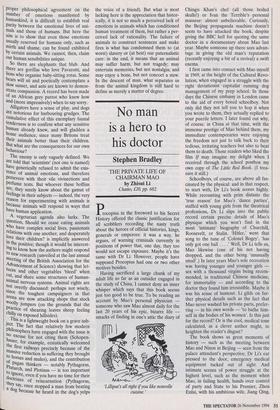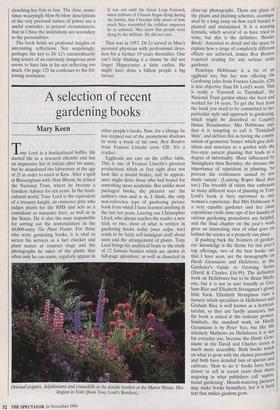No man is a hero to his doctor
Stephen Bradley
THE PRIVATE LIFE OF CHAIRMAN MAO by Zhisui Li Chatto, £20, pp. 682 Procopius in the foreword to his Secret History offered the classic justification for all scribblers recording the nasty truth about the heroes of official histories, kings, generals or emperors: it was a way, he argues, of warning criminals currently in positions of power that, one day, they too would not escape exposure. Maybe it's the same with Dr Li. However, people have supposed Procopius had one or two other motives besides.
Having sacrificed a large chunk of my adult life so far as an outsider engaged in the study of China, I cannot deny an inner whisper which says that this book seems just too good to be true. To be reading an account by Mao's personal physician someone who saw Mao almost daily for the last 20 years of his epic, bizarre life smacks of finding in one's attic the diary of 'Lilliput's all right if you like nouvelle cuisine.' Chingis Khan's chef (all those boiled skulls!) or Ivan the Terrible's personal masseur: almost unbelievable. Curiously, the Beijing propaganda machine doesn't seem to have attacked the book, despite giving the BBC hell for quoting the same doctor in a documentary about Mao last year. Maybe someone up there sees advan- tage in giving the old man's reputation (recently enjoying a bit of a revival) a swift enema.
I first came into contact with Mao myself in 1969, at the height of the Cultural Revo- lution, when engaged in a struggle with the right deviationist capitalist running dog management of my prep school. In those days the Chinese embassy in London came to the aid of every bored schoolboy. Not only did they not tell you to hop it when you wrote to them, they actually replied to your puerile letters. I later found out why, of course: in China at that time, with the immense prestige of Mao behind them, my immediate contemporaries were enjoying the freedom not just to talk back to their tedious, irritating teachers but also to beat them to death. Those readers who liked the film If may imagine my delight when I received through the school postbox my own copy of The Little Red Book. (I trea- sure it still.) Schoolboys, of course, are above all fas- cinated by the physical: and in that respect, to start with, Dr Li's book scores highly. While recounting with prim distaste the `true reason' for Mao's 'dance parties', staffed with young girls from the theatrical professions, Dr Li slips into the public record certain precise details of Mao's physique which you won't find in the most 'intimate' biography of Churchill, Roosevelt, or Stalin. 'Hitler,' went that song to the tune of 'Colonel Bogey', 'has only got one ball . . . .' Well, Dr Li tells us, Mao likewise (one of his not having dropped, and the other being 'unusually small'.) In later years Mao's sole recreation was having younger and younger girls sex with a thousand virgins being recom- mended, in traditional Chinese medicine, for immortality — and according to the doctor they found him irresistible. Maybe it was his sense of humour. Li gilds on fur- ther physical details such as the fact that Mao never washed his private parts, prefer- ring — in his own words — 'to bathe him- self in the bodies of his women'. Is this just for the record? Or is the cool, medical tone calculated, as a clever author might, to heighten the reader's disgust?
The book shows us great moments of history — such as the meeting between Mao and Nixon in Beijing — seen from the palace attendant's perspective; Dr Li's ear pressed to the door, emergency medical equipment tucked out of sight. And intimate scenes of power struggle at the highest level, such as the moment when Mao, in failing health, hands over control of party and State to his Premier, Zhou Enlai, with his ambitious wife, Jiang Qing,
clenching her fists in fury. The close, some- times wearyingly blow-by-blow descriptions of the very personal nature of power are a useful reminder, in present circumstances, that in China the institutions are secondary to the personalities.
The book holds no profound insights or interesting reflections. Not surprisingly, perhaps; the key to Dr Li's extraordinarily long tenure of an extremely dangerous post seems to have lain in his not reflecting too much. On page 125 he confesses to the fol- lowing revelation:
It was not until the Great Leap Forward, when millions of Chinese began dying during the famine, that I became fully aware of how much Mao resembled the ruthless emperors he so admired. Mao knew that people were dying by the millions. He did not care.
That was in 1957. Dr Li served as Mao's personal physician with professional devo- tion for a further 19 years thereafter. One can't help thinking it a shame he did not forget Hippocrates a little earlier. He might have done a billion people a big favour.











































































 Previous page
Previous page